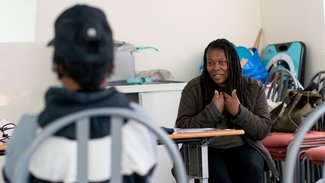In partnership with Hibiscus Initiatives, Muslim Women In Prison, Zahid Mubarek Trust, Criminal Justice Alliance and Women In Prison, Women's Justice Reimagined aims to improve outcomes and reduce inequalities and discrimination against Black, Asian, minoritised and migrant women in contact with the criminal justice system.
Too-often ignored, women face the ‘double disadvantage’ of gender inequality and racism when they encounter the criminal justice system. This stops them from getting the support they need both within the system and when they try to rebuild their lives outside, leaving them at risk of reoffending.
Women’s experiences of violence and abuse can drive them into the criminal justice system, with many serving short sentences for non-violent offences. Many face further abuse and vulnerability as they experience the ‘ripple effects’ of criminal justice involvement like worsening mental health, isolation, and poverty. For Black, Asian, minoritised and migrant women these experiences can be compounded by racism and discrimination. In many cases women can face additional disadvantage in the form of faith inequalities when they encounter the criminal justice system.
In line with this, our 10-point action plan for change, developed through consultation with women with lived experience as well as government officials and specialist organisations, provides clear steps that are needed to make a real difference in the lives of the most marginalised women in our community.
On March 1st, 2023, the Tackling Double Disadvantage Partnership held a ‘One Year On’ roundtable to take stock of progress to date. Most recently, Kate Osamor MP secured a Westminster Hall Debate on July 5th, 2023 on behalf of the partnership to consider Black, Asian, minoritised, and migratised women survivors of abuse who are accused of offending and we have produced a progress briefing.
In 2024, Tackling Double Disadvantage was renamed to the Women's Justice Reimagined Partnership.






